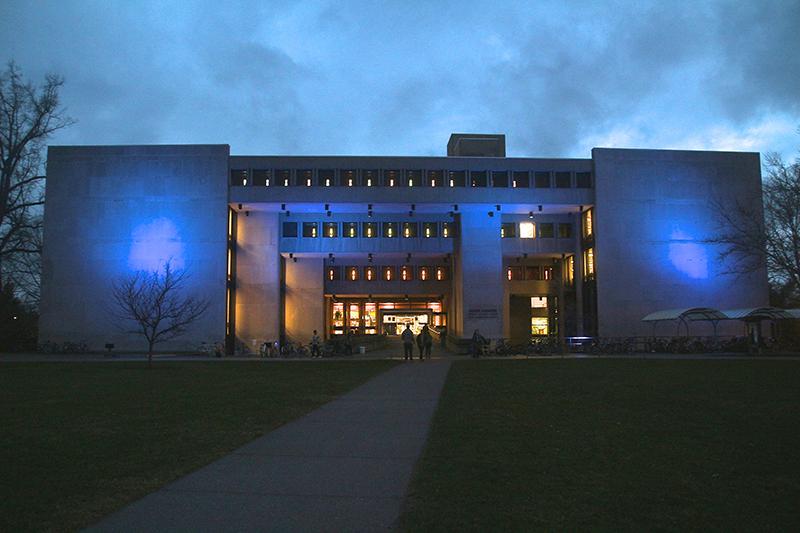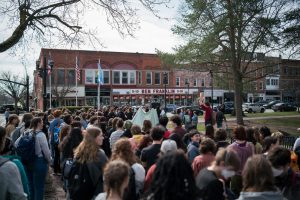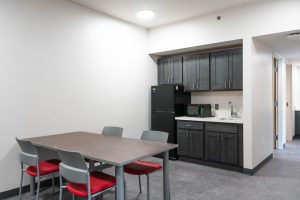Organizers Light Mudd Up for Autism
Blue floodlights light up Mudd library to raise awareness for autism. Several students and the Office of Disability Services collaborated on the project. A panel on autism and a series of film screenings will take place in the coming weeks.
April 3, 2015
Organizers lit up the exterior of Mudd library with blue floodlights on Thursday night to raise awareness for autism as part of Light It Up Blue, an international campaign started by the autism advocacy organization Autism Speaks. The display marks the beginning of a series of events — including a panel and three film screenings — put on by student organizers and the Office of Disability Services.
“What I’m doing by this is just raising awareness on campus in general, because autism is not really as visible as, say, gender identity or race, or as widely talked about,” said College senior Alex Rosen, who played an instrumental role in organizing the event and describes himself as “high on the [autism] spectrum.”
According to Jane Boomer, director of the Office of Disability Services, Oberlin has a significant population of students on the autism spectrum.
“There are about 50 [students on the spectrum] that have disclosed to us,” Boomer said. “Most often, the statistics say that if there are 50 that disclose, there are twice as many who haven’t disclosed. I don’t know, … but it’s not a small number of students on the spectrum for a small school.”
Boomer and Rosen both believe Oberlin to be, for the most part, a welcoming community for autistic students. “I certainly think that Oberlin is a very nice and tolerant environment [ for autistic students], seeing as they are so tolerant of other major issues,” said Rosen.
However, both Rosen and Boomer also indicated that increased mindfulness by community members could make the College a better place for students on the spectrum and neurotypical students alike.
“Most students are very willing to accept some kind of disability when they understand it,” Boomer said. “Showing these movies and having our panel discussion is an attempt to have more of our student population, and staff and faculty too, have an understanding that autism doesn’t have to … only have one face. That there is variety inside the autism spectrum and that getting to know that person will probably enrich someone’s life, including your own.”
The fact that the Light It Up Blue campaign was originally started by Autism Speaks has also generated some controversy, as some students find fault with the organization’s core beliefs about the nature of autism.
“When we talk about autism, we talk about it in one of two ways,” said College first-year El Wilson. “Either it’s all about finding a cure, making it go away and branding autistic people as sick. Or you promote neurodiversity and say it’s OK to have autism. We’re all different and autism is a different way of thinking. … [Autism Speaks] only talks about finding a cure rather than [about] the amazing people throughout history who have done amazing things with autism and including autistic people in society.”
Rosen emphasized that he did not at all share the “curebie” perspective: the idea that autism should be treated as a disease to be cured.
“I am certainly trying to advocate for autism awareness on my own terms, and I believe that’s done by emphasizing how society can change its viewpoints on people who have autism,” said Rosen.
Boomer indicated that she was surprised by the controversy because she said didn’t know very much about Autism Speaks as an organization.
“I don’t think I know enough about the controversy, but it will be helpful as we move forward to have more student input on this. I see the different camps and where they’re standing, and I hope next year to be able to balance some of the positions with some presentations that emphasize neurodiversity. … We didn’t intentionally do anything to support Autism Speaks, and we aren’t collecting any funds,” Boomer added.
The panel will be held at noon on April 13 in Wilder 112 and will include Rosen, his mother and Bethan Baker, a psychologist with the Oberlin City school system. The film Mary and Max will be screened on April 12 in Wilder 101 at 1 p.m. with Wretches and Jabberers following at 3 p.m. Adam will be shown on April 15 at 7 p.m. in Dye Lecture Hall.
Rosen personally created several PSAs to be shown shortly before the films. The PSAs show everyday situations in which neurotypical students can show more sensitivity for autistic people.
“Through patience, neurotypical people can really see that people on the spectrum can be very expressive and very talented in ways they might not have known. So don’t underestimate people on the spectrum,” Rosen said. “That would be my message for everyone out there.”


























